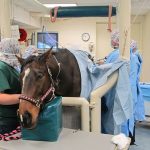Gaining admission into any of the best veterinary schools in Massachusetts is the first step to becoming a vet in the state if you fancy animal care. Just like training to become a doctor or engineer, going to a vet school prepares you to become a veterinarian.
If you have made a choice to study in Massachusetts, then the first right step is to enroll in a vet program in one of the best schools. Currently, Massachusetts has quite a number of schools that are offering vet program degrees at different educational levels.
Here in this guide, we have made a list of accredited schools and colleges in Massachusetts with accredited vet programs. We have done our research to note that these schools have a good education foundation and have state-of-the-art facilities that will give students hands-on training for real-world engagement. We have also written down insights about these schools and their unique details and why you should choose any of them as your possible school.
However, if the vet colleges in Massachusetts do not suit your educational goal, click on the link Veterinary Schools to explore other locations with great vet schools.
How Many Veterinary Schools Are In Massachusetts?
Currently, Massachusetts has eight colleges with veterinary programs. Each of the schools is accredited and has good quality in delivering quality education across many disciplines including veterinary programs.
Related Posts
- 10 Best Vet Schools in California
- 4 Best Vet Schools in British Columbia
- 10 Best Vet Schools in Texas To Get Into
- 13 Best Veterinary Schools In Florida | Detailed Guide
- 10 Best Veterinary Schools In Georgia | Detailed Guide
- 3 Best Veterinary Schools In Arkansas | Detailed Guide
What You Should Consider Before Going to Vet Schools in Massachusetts
There are quite a number of vet schools in Massachusetts making a choice can be tedious because each school has its uniqueness.
Just before you enroll in a vet program in any school in Massachusetts, there are key factors you must put into consideration;
- Accreditation
- Acceptance Rate
- Curriculum strength.
- Number of Programs.
- Location of school and safety
- Graduation & Employment Rate.
- Presence of professional teachers.
- Availability of hands-on practical training.
ALSO READ: 10 Best Football Colleges In Massachusetts – Detailed Guide
What are the Best Veterinary Schools in Massachusetts?
Our job at Zikky is to help you find the perfect school for you. As such we have done our research and come up with the best veterinary colleges in Massachusetts for students seeking to become a veterinarian.
Our choice of schools was made based on the overall quality of the school, the quality of the veterinary program they offer based on universal rankings, and the structure of the school to ensure the students gain hands-on training for practice upon graduation.
1. Holyoke Community College
- Veterinary Program Offered: Associate Degree
Holyoke Community College is a community college in Massachusetts and one of the state’s best when it comes to veterinary programs. At Holyoke, students get to enroll in an AAS vet program accredited by CVTEA which lasts for two years.
In two years students learn how to treat animal patients, administer drugs, collect and process laboratory samples, and carefully document records. Also, the college ensures that all students of the vet program must adhere to the professional ethics as set by the National Association of Veterinary Technicians of America (NAVTA).
Keep in mind that vet students at Holyoke Community College go on two externships and Holyoke graduates has an 81 percent VTNE pass rate.
2. Massasoit Community College
- Veterinary Program Offered: Associate Degree
To enroll in Massasoit Community College as a vet student requires that you have taken classes in intermediate algebra, reading, introductory letter, and biological principles.
Once you get in, the emphasis shift from all of those to courses such as animal anatomy and physiology; patient assessment; proper handling and maintenance; office procedures; veterinary parasitology; customer service; surgery and anesthesia, etc
Keep in mind that Massasoit Community College takes two years and Massasoit graduates have an 81 percent VTNE rate.
ALSO READ: 8 Best Veterinary Schools In Oregon | Detailed Guide
3. Mount Wachusett Community College
- Veterinary Program Offered: Associate Degree
Mount Wachusett Community College is one of the best veterinary colleges in Massachusetts offering a two-year program in veterinary technology.
Getting into Mount Wachusett Community College is competitive however, once you are in, students engage in learning about animal diseases, veterinary radiology, anatomy and physiology of pets, and even farm medicine.
Beyond classes, students at Mount Wachusett Community College go for two 120-hour rotations of internships to gain hands-on experience.
4. North Shore Community College
- Veterinary Program Offered: Associate Degree
North Shore Public College offers a two-year degree in veterinary technology which leads to earning an AAS degree upon completion. Some of the courses taken at NSPC include classes in dog and cat behavior; medical terminology; veterinary parasitology etc
Admission into North Shore Public College is a little different. Prospective students must first attend an information session at the end, they will receive a certificate of participation, which must be submitted with the application.
Once in, students engage in real practice while being a student. All animals used in the facility for practice are treated, kept, cared for, and transported humanely and ethically through its Animal Welfare and Use Committee.
ALSO READ: 3 Best Veterinary Schools In Maryland | Detailed Guide
5. University of Massachusetts-Amherst
- Veterinary Program Offered: Bachelor’s Degree
Another school to consider for veterinary studies is the University of Massachusetts at Amherst. While most veterinary schools in Massachusetts offer an Associate degree program, the University of Massachusetts offers a bachelor’s degree vet technology program which lasts four years.
The first two years are for classroom and laboratory studies, the following two years are focused on learning and training in specialized veterinary technology facilities at the University of Massachusetts.
Emphasis of study is placed on clinical care for large animals, veterinary microbiology, anesthesia and surgery for small animals, and even parasitology.
6. Becker College
- Veterinary Program Offered: Associate and Bachelor’s Degree
At Becker College, students have various options for vet degrees. From an Associate’s degree to a Bachelor’s degree, vet students have a wide range of options at the campus in Worcester, Massachusetts.
Keep in mind that Becker College degrees last for four years and they are accredited by the New England Association of Schools and Colleges Commission of Higher Education accredits the college.
ALSO READ: 8 Best Veterinary Schools In Ohio | Detailed Guide
7. Mount Ida College
- Veterinary Program Offered: Associate and Bachelor’s Degree
At Mount Ida College, you get to enroll for either an Associate’s or a bachelor’s degree in their veterinary program. Mount Ida College is one of the best veterinary schools in Massachusetts with a track record of delivering quality education across many disciplines.
The veterinary program at Mount Ida College lasts for four years and is accredited by the New England Association of Schools and Colleges Commission on Higher Education.
Keep in mind that Mount Ida College is a private small school with a student population of 1,320 students which makes it suitable for students who want to pursue a degree in a small school setting. Tuition is a bit high averaging at $32,300 plus $1,000 for study materials.
8. Berkshire Community College
- Veterinary Program Offered: Certificate Degree
Unlike most veterinary colleges in Massachusetts, Berkshire Community College offers neither an Associate’s nor a Bachelor’s degree but it offers a certificate program in veterinary studies.
Berkshire Community College is a small college with a student population of 2,230 students. Its veterinary program lasts for 2 years and is accredited by the New England Association of Schools and Colleges Commission of Higher Education accredits the college.
Tuition is a bit high at Berkshire Community College. On average, tuition is approximately $4,866 for in-state students and $10,482 for out-of-state students plus $1,009 for additional supplies
How Do I Become a Veterinarian in Massachusetts?
All you need to become a veterinarian in Massachusetts is to get a degree in your preferred vet specialty after which you fulfill the requirements as stated by the Massachusetts Association of Veterinary Technicians.
After the requirements are duly met, you can go on to practice as a veterinarian in Massachusetts.
ALSO READ: 4 Best Veterinary Schools In Missouri | Detailed Guide
Veterinary Schools in Massachusetts FAQs
What’s the job outlook for vets in Massachusetts?
In Massachusetts, the Bureau of Labor Statistics expects the number of job openings for vets to grow by 16 percent between 2019 and 2029. This creates about 18,300 new veterinary positions in the state. This is higher than the 4% estimation for all professions.
Do I need a certification to practice as a veterinarian in Massachusetts?
You do not need certification to practice as a veterinary technician in Massachusetts but if you have a certification it is a definite advantage.
How do I get the MVTA certification in Massachusetts?
To get the MVTA certification, you must
- Apply and pass a VTNE with a score of at least 425.
- Send an official transcript of an accredited CVTEA program in veterinary technology.
- Pay a sum of $65.
How much do vets in Massachusetts make?
Veterinarians working in Massachusetts make about $40,120 – $54,590 in a year, this is higher than the national average of $32,570.
On the other hand, veterinary assistants and animal care workers earn an average salary of $32,280 in Massachusetts.
What does it take to work as a vet in Massachusetts?
While you do not need a license to work as a vet in Massachusetts, you must be trained in a veterinary technology program accredited by the American Veterinary Association (AVMA). Also, you must pass the National Veterinary Technician Exam (VTNE).
Conclusion
Having read through this detailed guide above, we believe you have all you need to know about veterinary colleges, schools, and the best institutions for vet programs in Massachusetts.
Ensure that the school you choose is accredited by the American Veterinary Medical Association (AVMA). Once you have made a choice of institution we encourage you to visit the school website once to find out what the requirements are for your application to the school. Also, confirm with specificity the tuition costs for the program you’re enrolling into.
References
- https://veterinary-colleges.com/massachusetts
- https://www.academicrelated.com/veterinary-schools-in-massachusetts/












